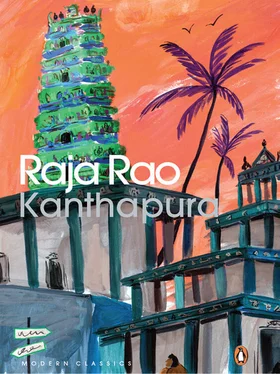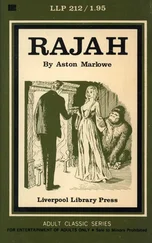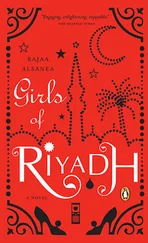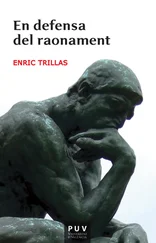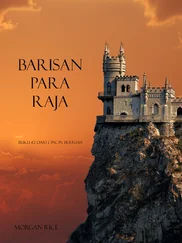They said, too, that it was Bhatta who had sent our Fig-tree-house Ramu to the city for studies. Why should he have done that? Ramu was not his son or nephew, but just a distant relation. ‘If you will bring a name to Kanthapura — that is my only recompense. And if by Kenchamma’s grace you get rich and become a collector, you will think of this poor Bhatta and send him the money — with no interest, of course, my son, for I have given it in the name of God. If not, may the gods keep you safe and fit. ’
I tell you, he was not a bad man, was Bhatta. But this dislike of the Gandhi-bhajan surprised us. After all there was no money in it, sister! But don’t they say, ‘Less strange are the ways of the gods than are the ways of men.’
One day, when Bhatta was returning from the river after his evening ablutions, he did not turn at the Mari-temple corner, but went straight along the Lantana lane and hurried up the steps of the Kannayya house. Old Ramakrishnayya was sitting on the veranda, his hand upon his nose, deep-breathful in meditation. Satamma was lying by the door, her head upon her arms, resting. And from the byre came the sound of milking — Rangamma was there.
As soon as Satamma saw Bhatta, she rose up quickly and asked why he had deigned to honour them so, and what happy news brought him there and how his wife and children were; and Bhatta answered it all by saying how very busy he had been, what with the bad rains and the sick cattle, and the manuring work and the hoeing work and the weeding work, and to top it all, those bonds and bonds and bonds to sign — really, if the very devils wanted to take his place, he would say, Take it! and bless those generous souls. ‘Really, Aunt, this business is terrible. One cannot even go and see if one’s relations are dead or alive. How are you all, Aunt?’
‘Like this. As usual.’
Then the byre door creaked and Rangamma came out with a sobbing lantern in one hand and the bright frothing milk pot in the other, and when she hears a stranger’s voice, she says, ‘Is it Bhattarè? What an honour!’ And Bhatta speaks again of the rains and the cattle and the peasants, and Rangamma goes in and comes out again and sits with the others. Ramakrishnayya has finished his meditation, and leaning against the wall he sits quietly in the dark. He was a silent, soft-voiced, few-worded man, our Ramakrishnayya.
‘Has your son found a good horoscope to go with his daughter’s?’ Bhatta begins again. ‘It is so difficult to find bridegrooms these days. When I was in town the other day, I went to see old Subrama Pandita. And he was telling me how he could find no one for his last granddaughter. No one. Every fellow with a Matric or an Inter asks, “What dowry do you offer? How far will you finance my studies? — I want to have this degree and that degree.” Degrees. Degrees. Nothing but degrees or this Gandhi vagabondage. When there are boys like Moorthy, who should get safely married and settle down, they begin this Gandhi business. What is this Gandhi business? Nothing but weaving coarse handmade cloth, not fit for a mop, and bellowing out bhajans and bhajans, and mixing with the Pariahs. Pariahs now come to the temple door and tomorrow they would like to be in the heart of it. They will one day put themselves in the place of the Brahmins and begin to teach the Vedas. I heard only the other day that in the Mysore Sanscrit College some Pariahs sought admission. Why, our Beadle Timmayya will come one of these days to ask my daughter in marriage! Why shouldn’t he?’
Rangamma lifts her head a little and whispers respectfully, ‘I don’t think we need fear that, Bhattarè. The Pariahs could always come as far as the temple door, couldn’t they? And across the Mysore border, in Belur, they can even enter the temple once a year. ’
‘That is what you think, Rangamma. But I, who so often go to the city, I see it more clearly. Listen! Do you know Advocate Rama Sastri, the son of the old, orthodox Ranga Sastri, has now been talking of throwing open his temple to the Pariahs? “The public temples are under the Government,” he says, “but this one was built by my ancestors and I shall let the Pariahs in, and which bastard of his father will say no?” I hope, however, the father will have croaked before that. But really, Aunt, we live in a strange age. What with their modern education and their modern women. Do you know, in the city they already have grown up girls, fit enough to be mothers of two or three children, going to the universities? And they talk to this boy and that boy; and what they do amongst themselves, heaven alone knows. And one, too, I heard, went and married a Mohammedan. Really, Aunt, that is horrible!’
‘That is horrible,’ repeats Satamma. ‘After all, my son, it is the Kaliyuga floods, and as the sastras say, there will be the confusion of castes and the pollution of progeny. We can’t help it, perhaps. ’
But Rangamma whispers again from the corner: ‘Has the Mahatma approved it? I don’t think so. He always says let the castes exist, let the separate eating exist, let not one community marry with the other — no, no, Bhattarè, the Mahatma is not for all this pollution.’
‘Is that why, Rangamma,’ interrupts Bhatta angrily, ‘is that why the Mahatma has adopted a Pariah girl as a daughter? He is a Vaisya and he may do what he likes. That does not pollute me. But, Rama-Rama, really if we have to hang the sacred thread over the shoulders of every Pariah. it’s impossible, impossible. In fact that’s what I was saying to the Swami the other day.’
‘Why, have you been to the Swami?’ asks Satamma, eagerly.
‘When I was last in the city, yes. He had come back from his tour in Mysore. And I, good Brahmin that I am, I went to touch his feet and ask for the tirtham. You know our Seetharamu, Maddur Seetharamu, is his master of the household. And he is my wife’s elder brother’s wife’s brother-in-law. And after I have seen the Swami, I go to see Seetharamu and we speak of this and that, of Hariharapura, of Kanthapura and Talassana, and then suddenly he turns to me and says, “I want your help, Bhattarè”—And I say, “What can I do for you, Seetharamu? Anything you like!”—He says, “The Swami is worried over this Pariah movement, and he wants to crush it in its seed, before its cactus roots have spread far and wide. You are a Bhatta and your voice is not a sparrow voice in your village, and you should speak to your people and organize a Brahmin party. Otherwise Brahminism is as good as kitchen ashes. The Mahatma is a good man and a simple man. But he is making too much of these carcass-eating Pariahs. Today it will be the Pariahs, tomorrow it will be the Mohammedans, and the day after the Europeans. We must stop this. The Swami says he will outcaste every Brahmin who has touched a Pariah. That is the right way to begin. Bhattarè, we need your help.”—”Well, Seetharamu,” say I, “this Bhatta who has been a pontifical Brahmin cannot be on the side of the Pariahs. And I know that in our good village there is no Brahmin who has drunk of our holy Himavathy’s water and wants caste pollutions. I shall speak to our people,” say I. And that is why I have come to see you.’
Rangamma and Satamma and Ramakrishnayya are troubled and silent. From the lit Front-house comes the
Rock, Rock,
Rock the cradle of the Dancer,
Rock the cradle of the Blue God,
Rock the cradle of the Blissful,
Rock the cradle of the One,
Rock, Rock, Rock,
and from the byre comes the noise of the calves sucking and the spitting sounds of the wall lizards, and from the temple square tamarind comes the evening clamour of the hanging bats. Suddenly a shooting star sweeps across the sky between the house roof and the byre roof, and Ramakrishnayya says, ‘Some good soul has left the earth.’
Читать дальше
